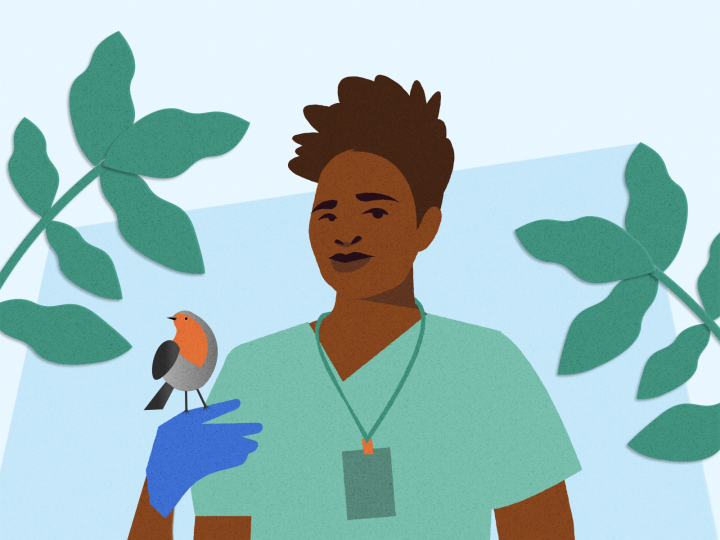Zoologists & botanists
How To Become an Ornithologist (Plus Salary and Careers)
Updated January 6, 2023

Ornithologists conduct field and laboratory research to learn more about the behaviors, habitats and migration patterns of birds to protect them from endangerment. You can become an ornithologist by gaining specific skills, abilities and experience to grow and excel in the field. If you're interested in a career as an ornithologist, it's helpful to understand the required education, skills and training for this profession.In this article, we discuss what an ornithologist does, describe how to become one and outline their average salary, job outlook and work environment to help you explore this career path.
Explore jobs on Indeed
What is an ornithologist?
An ornithologist is a scientist who researches and studies birds and their behavioral patterns. Ornithologists may spend extended periods surveying birds' activities and preparing scholarly reports on their findings. Some ornithologists choose to specialize in a certain breed, species or group of birds, while others may choose a more general path where they analyze all kinds of birds in natural habitats.Related: 20 Career Options for Working With WildlifeWhat does an ornithologist do?
Ornithologists closely examine and analyze birds to understand their behaviors and patterns. These scientists use their research to develop solutions to conserve and protect birds from endangerment or extinction. While an ornithologist's responsibilities can vary, they often have the following duties:- Conducting field research to analyze migration patterns, habitat needs and reproduction methods or rates
- Monitoring and determining the population and health of different bird species
- Tracking movements of birds by catching and branding them
- Collecting data on bird populations and analyzing them closely
- Building development projects by performing wildlife impact assessments
- Developing policies and implementing advocacy movements to keep birds safe and protected
How to become an ornithologist
Follow these steps to become a successful ornithologist:1. Earn your bachelor's degree
After graduating high school, attend an educational institution to earn a bachelor's degree in zoology, ecology, biology or wildlife biology. During an undergraduate program, take courses in various subjects, including mathematics, statistics, physiology, wildlife management and animal anatomy, to prepare for a career as an ornithologist. These classes can teach you how to study and care for different wildlife, including birds.Related: 19 Degrees You Can Get To Work With Animals2. Gain experience in an internship
To gain hands-on experience, consider pursuing an internship in a laboratory. Search for internships with zoos, wildlife organizations or government agencies. These internships may allow you to assist experienced ornithologists and shadow them to understand what it's like to work in the field.Experienced ornithologists may teach you how to collect data and samples from birds and study them closely in the laboratory. Gaining hands-on experience in a laboratory, either before or after you graduate, can be an impressive credential to list on your resume. It can also help you differentiate yourself from other candidates.Related: How To Find an Internship (And Why It's Important)3. Develop relevant skills
To be a successful ornithologist, you can develop and improve skills to excel in your career. Try to learn these skills during an internship or entry-level role. Common skills that are beneficial for ornithologists to have include:- Mathematical and statistical knowledge
- Technical and computer abilities
- Written and verbal communication
- Research skills
- Critical thinking and problem-solving
- Data and analytical abilities
4. Pursue volunteer opportunities
You can also gain hands-on experience and knowledge about birds and their habitats through volunteering. There are many nonprofits and conservation agencies that look for volunteers to help care for and research wildlife. Volunteering can provide you with excellent experience, knowledge and skills to use toward pursuing an ornithologist role. You can also feature your volunteer work on your resume. This experience can help showcase your passion for working with birds to potential employers.Related: How To Add Volunteer Work to Your Resume (With Examples)5. Get an advanced degree
If you'd like to advance in the field and study more complex data sets, conduct high-level wildlife experiments or teach others about wildlife behaviors, you can pursue your master's degree. Getting this degree also qualifies you to teach at many universities. Consider pursuing your Master of Science in biology or wildlife biology. These graduate programs typically provide in-depth studies of wildlife conservation and include various coursework, such as biometry, behavioral ecology and avian conservation and management.Related: 10 Jobs for People With a Master's in BiologyOrnithologist salary and job outlook
The median annual wage for zoologists and wildlife biologists, including ornithologists, is $64,650 per year, according to the United States Bureau of Labor Statistics (BLS). The salary you may earn as an ornithologist can vary based on your geographic location, employer, education and experience. For example, you can often increase your earning potential by earning a master's degree or pursuing a specialty.The BLS expects employers to have about 1,500 job openings each year for ornithologists and other wildlife biologists over the next decade, which equates to 1% growth in that period. While employment growth may be low, the agency says some employers may have a demand for ornithologists who can research ecosystem changes and develop conservation plans to protect wildlife. Ornithologists may also find employment as other scientists leave the workforce to retire or transition into other fields.Related: What Is the Average Zoologist Salary? (And How To Become One)Ornithologist work environment
Ornithologists typically work outdoors in the field and in laboratories to analyze their research findings. They may travel to remote locations throughout the city, state or country to observe bird species. Others may have the option to travel internationally to study birds in exotic habitats.As an ornithologist, it's important to be in excellent physical health since you move regularly and spend a majority of your time outside. You may also receive exposure to all kinds of weather conditions, which can potentially be uncomfortable or dangerous. Many ornithologists work full time and may work early mornings, evenings or weekends to study birds at specific times, such as during breeding seasons.Related: 10 Outdoor Jobs That Pay WellGet personalized salary insights with the Indeed Salary Calculator
Career path options for ornithologists
Ornithologists typically have many career path options. Some choose to work in the field studying birds' habitats and behaviors. They may spend part of their time outside and the rest of their shifts in laboratories, studying the data and samples they collect. Many of these ornithologists work for federal or state government entities, land and wildlife organizations or conservation nonprofits.Other ornithologists who want to work with birds and potentially other wildlife may serve in wildlife parks or zoos performing veterinary tasks or conducting research as an environmental scientist. Some may decide to work in a classroom and teach students about birds and other wildlife at universities. Ornithologists may also become legislative advocates, wildlife biologists, land managers or researchers.
Explore more articles
- 21 Jobs That Wear Scrubs
- The Pros and Cons of Working as an Emergency Medicine Physician
- 12 Online Typing Jobs You Can Do From Home
- How To Become a Pro Video Gamer: 10 Steps for Success
- 14 Interesting Jobs for Firefighters After Retirement
- Radiology Technician vs. Technologist: What's the Difference?
- 26 Jobs That Don't Require Talking on the Phone (With Salaries)
- 12 Types of Medical Office Jobs (With Salaries)
- 56 Types of Bachelor's in Psychology Jobs To Consider
- What Does Temp-To-Hire Mean?
- How To Become a Private Military Contractor With No Military Experience
- Contract Work vs. Full Time: Advantages of Employment Types


